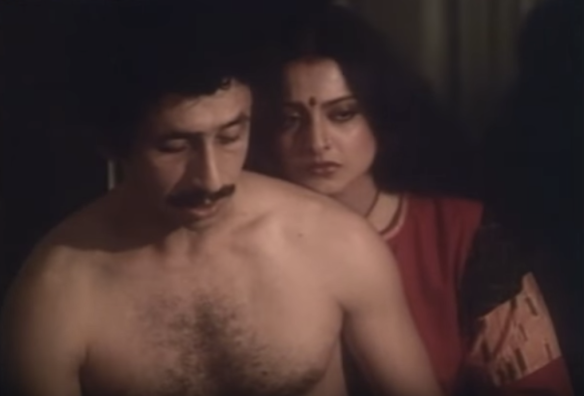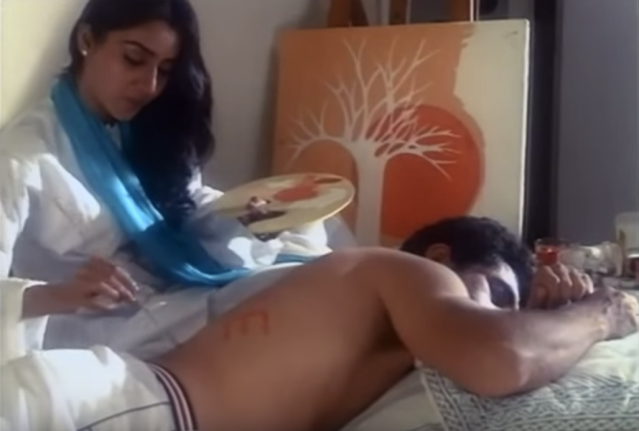
Anuradha Patel plays an impetuous and free-spirited woman who haunts her former lover and his current wife with her gift for poetry in Ijaazat (1987).
Released in 1987, Gulzar’s Ijaazat starring Naseeruddin Shah, Rekha, and Anuradha Patel is a film that falls outside of the time period traditionally associated with the “Golden Era” of Hindi cinema. Although we tend to feature films from the 1950s-1970s on this blog, an exception must be made for this film because of its timeless soundtrack composed by R.D. Burman, penned by Gulzar, and sung by Asha Bhonsle. Today, we present the lyrics and English translation to an ever-haunting gem from Ijaazat (1987): meraa kuchh saamaan.
Based on the Bengali story Jatugriha by Subodh Ghosh, this film presents the classic love triangle trope often used to excess in Bollywood in a refreshingly subtle and poignant manner that reflects the high caliber of Gulzar’s artistry as a poet-turned-director. The story in this film revolves around the relationships among three main characters: Mahinder (Naseeruddin Shah), Sudha (Rekha), and Maya (Anuradha Patel). Mahinder, a young photographer, has been engaged to his childhood friend Sudha for five years in an arrangement made by his grandfather (Shammi Kapoor). In spite of this arrangement, Mahinder falls passionately in love with the impulsive and free-spirited Maya, but he is too afraid to confide the truth to his grandfather. When pressured to go through with the wedding, the conflicted Mahinder reveals his true feelings to Sudha. However, when Maya suddenly disappears from his life, Mahinder decides to honor his grandfather’s wishes and marries Sudha after all. Even at the end of the film, a lingering question remains: why would Sudha agree to marry a husband who did not truly love her?

Rekha offers an understated performance as a vulnerable wife forced to grapple with her husband’s history with an ex-lover and its devastating effects on their marriage in Ijaazat (1987)
As the companionship between Sudha and Mahinder begins to grow, the underlying presence of Maya as an unwanted third party in their marriage inevitably leads to marital discord. Mahinder’s unresolved feelings for Maya and Sudha’s awareness of these feelings gradually creates tension that escalates once Maya re-appears in their lives and rekindles a friendship with Mahinder through letters, phone calls, and poems. Mahinder indulges Maya’s attention-seeking actions at each opportunity, deepening the rift that already exists between him and his wife. Despite many efforts to adjust to the very tangible presence of Maya in their lives, Sudha comes to realize that she will never be able to live happily with Mahinder and decides to walk away from her marriage. The turmoil and tragedy of this film goes on to culminate in a conclusion that is surprisingly positive and heart-warming–without completely spoiling the ending here, I will just say that fans of Shashi Kapoor will not be disappointed!
In spite of its portrayal of a relatively ordinary story, Ijazaat stands out from other films in the same vein because of its evocative dialogues, nuanced character development, and, of course, the beautiful music and poetry found in its soundtrack. In the context of the film, meraa kuchh saamaan is a poem addressed to Mahinder from Maya that captures the essence of their troubled relationship with remarkable finesse and sophistication. In this poem, Maya asks Mahinder to return her things back to her–these requests are not for the return of physical objects but rather for memories of their time spent together. Gulzar’s evocative poetry in an unusual free verse format earned him the National Film Award and Filmfare Award for Best Lyricist in 1988, while Asha Bhonsle won the National Film Award for Best Female Playback Singer for her soulful rendition of this song.

Anuradha Patel’s character is unique to the version of Jatugriha that is presented in Ijaazat (1987), as the original story depicted the woes of a troubled marriage between a husband and wife without the “other woman” character.
Those of you familiar with this classic already may have wondered why Gulzar chose to use the number 116 in the last stanza of this song to describes the number of moonlit nights spent together by the protagonists. Some have suggested that 116 nights may indicate that Maya and Mahinder were involved in a relationship four months in duration (with four new moons), while others have suggested it is a reference to the number of phases of the moon found in ancient Indian literature. Interestingly, when asked in an interview about the interpretation of this number, Gulzar said: “It’s not the number which is important, it’s important that somebody kept the count of the moonlit nights of which they spent together.” This number went on to carry special significance for Gulzar as he recounts in a 2005 interview that he has written lyrics for exactly 116 of R.D. Burman’s songs during his career.
Lyrics and Translation:
mera kuchh saamaan tumhare paas paDaa hai
Some of my belongings remain with you.
saavan ke kuchh bhiige bhiige din rakhe hai.n
A few wet monsoon days,
aur mere ek khat me.n lipaTii raat paDii hai
and a night folded into one of my letters.
voh raat bujhaa do, meraa voh saamaan lauTaa do
Extinguish that night, and return my things to me.
patjhaD hai kuchh, hai na?
It was autumn then, no?
patjhaD me.n kuchh patto.n kii girane kii aahaT
The rustling whispers of leaves falling in autumn.
kaano.n me.n ek baar pahan ke lauT aayii thii
I had brought back those whispers once by wearing them as earrings.
patjhaD kii voh shaakh abhii tak kaa.np rahii hai
A branch of autumn still trembles in the breeze.
voh shaakh giraa do, meraa voh saamaan lauTaa do
Make that branch fall down, and return my things to me.
ek akelii chhatrii me.n jo aadhe-aadhe bhiig rahe the
When we both became drenched in the rain under a single umbrella,
aadhe giile aadhe sukhe, sukhaa to mai.n le aayii thii
half of our things became wet. I had brought the dry half back with me that day.
giilaa man shayad bistar ke paas paDaa ho
But perhaps my drenched heart remained next to the bed.
voh bhijvaa do, meraa voh saamaan lauTaa do
Send that back, and return my things to me.
ek sau solaah chaa.nd kii raate.n, ek tumhaare kaa.ndhe kaa til
One hundred and sixteen moonlit nights, and the single mole on your shoulder.
giillii maha.ndii kii khushbuu, jhuuTh-muuTh ke shikve kuchh
The fragrance of wet henna, and some fake tantrums.
jhuuTh-muuTh ke vaade bhii sab yaad karaa duu.n?
Shall I remind you of all the false promises too?
sab bhijvaa do, meraa voh saamaan lauTaa do
Send all of them back, and return my things to me.
ek ijaazat de do bas, jab isko dafnaauu.ngii
When I bury these these things, just grant me the permission
mai.n bhii vahii.n so jaauu.ngii
To lay myself to sleep among them.
mai.n bhii vahii.n so jaauu.ngii
To lay myself to sleep among them.
Glossary
saamaan: belongings, things; saavan: monsoon; bhiigaa: drenched, wet; khat: letter; lipaTnaa: to wrap, fold; bujhaa denaa: to extinguish; lauTaa denaa: to return; patjhaD: autumn; pattaa: leaf; giranaa: to fall; aahaT: whisper, faint noise; pahanna: to wear; shaakh: branch; giraa denaa: to make something fall; chhatrii: umbrella; aadhaa: half; giilaa: wet; sukhaa: dry; bistar: bed; bhijvaanaa: to have something sent; ek sau solaah: 116; kaa.ndh: shoulder; til: mole; maha.ndii: henna: khushbuu: fragrance; jhuuTh-muuTh: fake, false; shikvaa: complaint, tantrum; vaadaa: promise: yaad karaa denaa: to remind; ijaazat: permission; dafnaanaa: to bury: so jaanaa: to sleep.
In 2005, Asha Bhonsle in collaboration with the Kronos Quartet reprised several of her old songs as a tribute to her late husband R.D. Burman in the album You’ve Stolen My Heart: Songs from R.D. Burman’s Bollywood. In recognition of her work on this album, Asha received her second Grammy nomination in the category of Best Contemporary World Music. When asked to name her favorite song from the album, she said it was meraa kuchh saamaan because it “is very close to my heart as it transports me back into time when I was with Pancham.” (Source).

An enchanting song and a well-made movie – what more could one ask for?! Thank you for rekindling the sweet memories of the era when lyrics used to be truly pregnant with meaning.
Dear Mr. & Mrs. 55- Great post. Superb song!
Cheers, Reiki Luce
Dear Mr. & Mrs 55, Thanks for this post, it was quite nice. I hope the next one would be from the ‘Golden Era’. A request for the song: चिंगारी कोई भड़के, तो सावन उसे बुझाये सावन जो अगन लगाये, उसे कौन बुझाये पतझड जो बाग़ उजाड़े, वो बाग़ बहार खिलाये जो बाग़ बहार में उजड़े, उसे कौन खिलाये
With Regards, Roy
Worth watching the story behind the music composition.. RD Burman’s reaction was “yeh bhi koi gaana hai, kal tu times of india leke aayega”
Pingback: Chapter 31: Affirmations | Second Chances
One of my favorite songs, and a very good movie too! Shashi Kapoor is handsome but Naseruddin Shah is unforgettable with his portrayal of the character! Thanks for reminding me of this wonderful movie
I did not understand the song completely and was looking for an explanation. Thank you for this! Special mention- the tiny stories from the vault that you share alongside the translation are amazing!